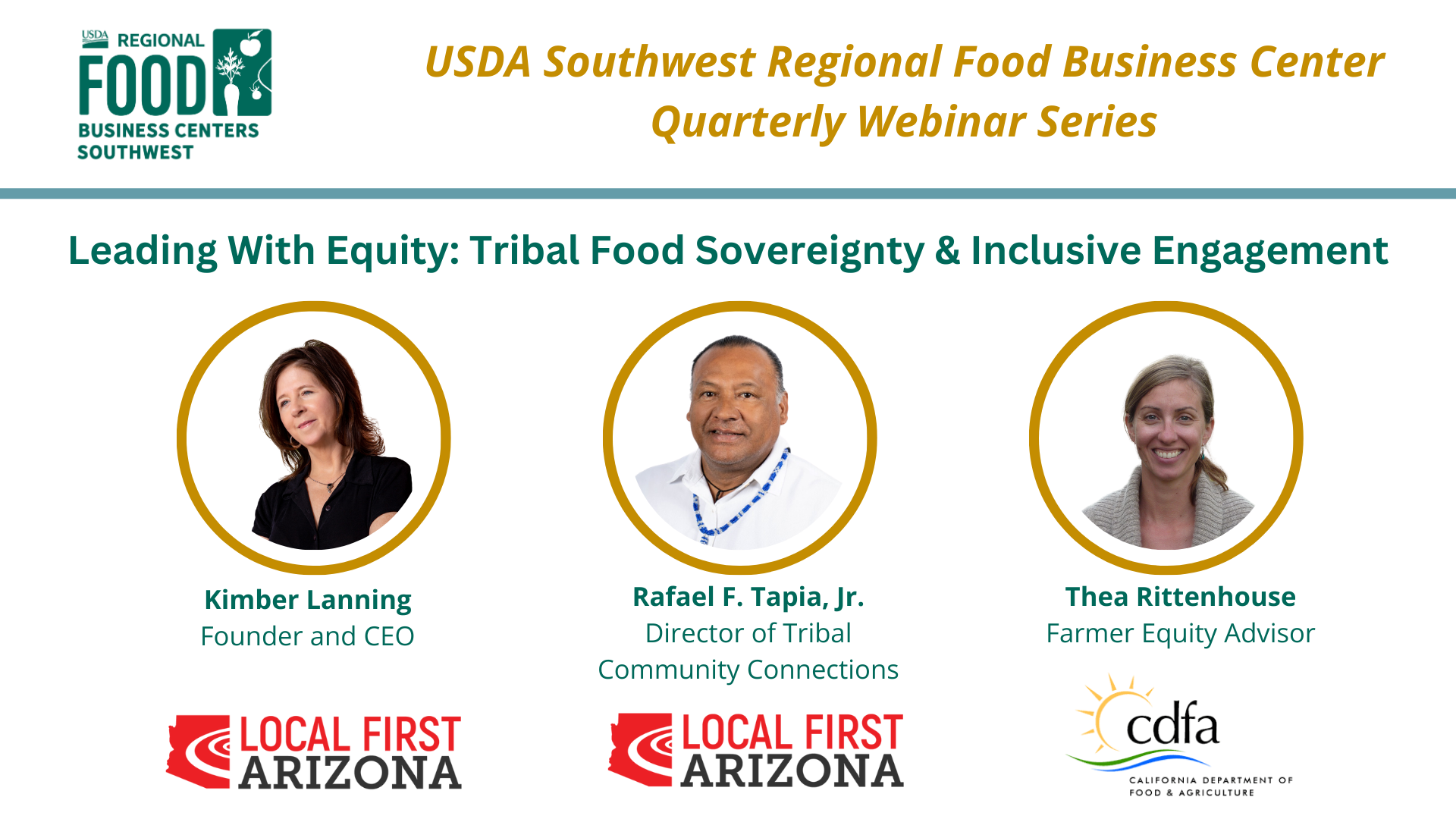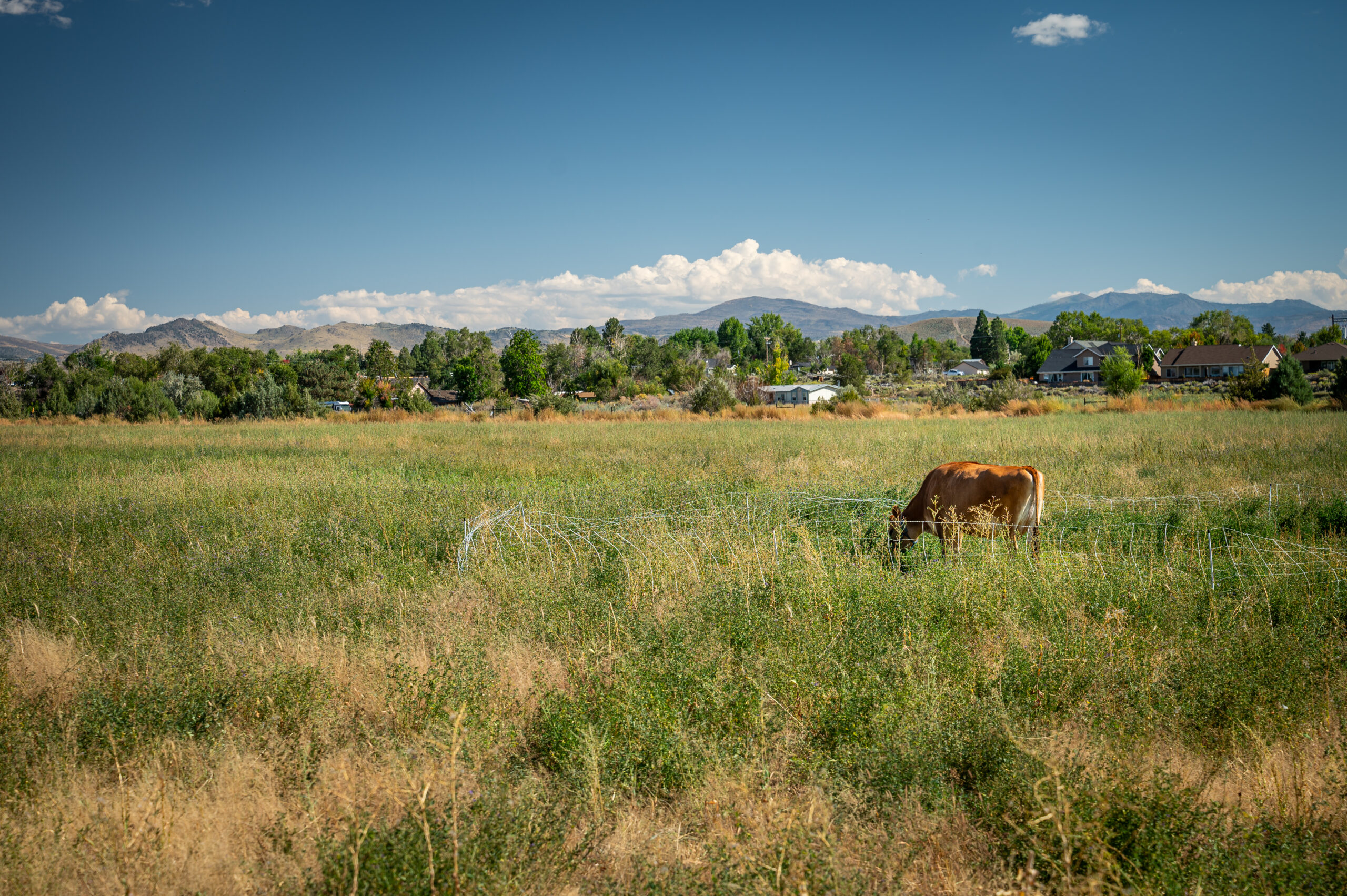Yolo Food Hub Facility Report
Resilient Cities Catalyst funded this report as part of their technical assistance and capacity-building support for the Yolo Food Hub network. The Yolo Food Hub Concept Design was developed by AECOM and informed by the Yolo Food Hub Network and community partners. This report has enabled the Yolo Food Hub Network to secure additional funding necessary to move the facility from planning to implementation.
USDA Southwest Regional Food Business Center Quarterly Webinar (July 2024)

Leading with Equity: Tribal Food Sovereignty & Inclusive Engagement
The USDA Southwest Regional Food Business Center’s first quarterly webinar, “Leading with Equity: Tribal Food Sovereignty & Inclusive Engagement,” featured speakers from Local First Arizona and California Department of Food and Agriculture.
Speakers discussed best practices for incorporating Indigenous knowledge and highlighted the unintended consequences of policies and funding that do not consider Tribal interests or approaches. They suggested pathways to build communication, develop partnerships, and establish trust. Additionally, the speakers addressed the critical infrastructure needed for Tribal communities, such as new wells, aggregating and distributing facilities, food-to-market distribution, and technical assistance, including business and market development skills.
Food System Financing Strategy – Phase II of the Sacramento Region Food System Action Plan
This report undertaken by Grassroots Globe and Valley Vision with the generous support of the Sacramento Region Community Foundation (SRCF) comprises Phase II of the 2021 Sacramento Region Food System Action Plan (Regional Action Plan) process and identifies strategies to meet the funding needs for a resilient, sustainable, and equitable food system. The development of targeted food system financing strategies has been a long-term priority for the region, as identified in the 2015 Sacramento Region Food System Action Plan and echoed across further reporting and initiatives completed over the years, including the research findings of a national landscape scan on governance and funding models undertaken by Grassroots Globe at the request of Soil Born Farms and the Healthy Food For All Collaborative. The region, part of the Great Central Valley, experiences chronic underinvestment in the food system, including from the philanthropic sector at the regional, state, and national levels. Most recently, the end of The California Endowment’s ten-year investment in the Building Healthy Communities initiative left a further gap in our funding infrastructure, particularly for the non-profit sector.
As America’s Farm to Fork Capital, strategic investments in the regional food system have the power to address pervasive, collective challenges connected to food and nutrition insecurity and food-related health crises; leverage the strong assets of our food and agriculture economy, including as a pathway for inclusive economic and community development; and accelerate the many innovative partnerships and activities, deepening their impact and surfacing best practices for replication. This is more important than ever given the increasing need for resilience in the wake of a changing climate and other systemic shocks, such as COVID-19.
The report focuses on three inter-related categories of funding pathways which provide orientation for the findings of this report: municipal finance tools, federal and state grants, and philanthropic fund models. While the latter two are familiar revenue sources for food systems partners, municipal finance tools represent an under-utilized pathway. As the field and framing of local economic development is increasingly being leveraged to bolster food systems revitalization in the post-COVID landscape, particularly in federal initiatives, municipal finance tools represent a unique opportunity for generating resources.
As such, this report takes a closer look at the range of tools available to local governments who were
called upon to play a more active and systematic role in the food system, as their investments can
improve community health and wellbeing while driving economic growth and opportunity.
USDA Southwest Regional Food Business Center

The Southwest Regional Food Business Center is a five-year $35 million program funded by the USDA Regional Food Business Centers Program, connecting Food and Agriculture Initiatives across Arizona, California, Nevada, and Utah. As part of the network of USDA Regional Food Business Centers, the Southwest Center is a hub for the region’s small and mid-tier food and farm businesses and local and regional food sector development initiatives.
In May 2022, University of California Agriculture and Natural Resources (UC ANR) was awarded by USDA to serve as the Southwest Center lead. Valley Vision, alongside UC ANR and UC Santa Cruz Center for Agroecology, serve on the Southwest Center Management Team. As part of the management team, Valley Vision leads communications, partnership development and coordination across the four states.
The Southwest Regional Food Business Center supports a more resilient, diverse, and competitive food system by providing localized assistance to access local and regional supply chains, including linking producers to wholesalers and distributors. The Center provides capacity building, technical assistance, and coordination to assist in access to new markets, access to federal, state, and local resources, and overcoming barriers to market access, with a focus on underserved farmers, ranchers, and food businesses.

Stay Connected with the Southwest Regional Food Business Center
Sign Up for the Quarterly Newsletter
Contact the Southwest Center: info@swfoodbiz.org
Sacramento Region CROP Profile
As part of the Coordinated Rural Opportunities Plan (CROP), this profile identifies priority areas for infrastructure investments and programs to strengthen the Sacramento Region’s food and agricultural cluster. The Coordinated Rural Opportunities Plan provides county and regional leaders the opportunity to address infrastructure investment challenges and collectively come together on solutions, including policies and investments, that will support the region’s agricultural sustainability and long-term economic health and resiliency. This profile summarizes key highlights from the county profiles and includes examples of innovative models that can be leveraged across the region for shared solutions and potential resources to meet vital infrastructure needs.
El Dorado County CROP Profile
As part of the Coordinated Rural Opportunities Plan (CROP), this profile identifies priority areas for infrastructure investments and programs to strengthen El Dorado County’s food and agricultural cluster. The Coordinated Rural Opportunities Plan provides county and regional leaders the opportunity to address infrastructure investment challenges and collectively come together on solutions, including policies and investments, that will support the region’s agricultural sustainability and long-term economic health and resiliency. This profile includes examples of innovative models that can be leveraged across the region for shared solutions and potential resources to meet vital infrastructure needs. CROP also includes a Regional Profile that summarizes key highlights from the county profiles.
Placer County CROP Profile
As part of the Coordinated Rural Opportunities Plan (CROP), this profile identifies priority areas for infrastructure investments and programs to strengthen Placer County’s food and agricultural cluster. The Coordinated Rural Opportunities Plan provides county and regional leaders the opportunity to address infrastructure investment challenges and collectively come together on solutions, including policies and investments, that will support the region’s agricultural sustainability and long-term economic health and resiliency. This profile includes examples of innovative models that can be leveraged across the region for shared solutions and potential resources to meet vital infrastructure needs. CROP also includes a Regional Profile that summarizes key highlights from the county profiles.
Sacramento County CROP Profile
As part of the Coordinated Rural Opportunities Plan (CROP), this profile identifies priority areas for infrastructure investments and programs to strengthen Sacramento County’s food and agricultural cluster. The Coordinated Rural Opportunities Plan provides county and regional leaders the opportunity to address infrastructure investment challenges and collectively come together on solutions, including policies and investments, that will support the region’s agricultural sustainability and long-term economic health and resiliency. This profile includes examples of innovative models that can be leveraged across the region for shared solutions and potential resources to meet vital infrastructure needs. CROP also includes a Regional Profile that summarizes key highlights from the county profiles.
Sutter County CROP Profile
As part of the Coordinated Rural Opportunities Plan (CROP), this profile identifies priority areas for infrastructure investments and programs to strengthen Sutter County’s food and agricultural cluster. The Coordinated Rural Opportunities Plan provides county and regional leaders the opportunity to address infrastructure investment challenges and collectively come together on solutions, including policies and investments, that will support the region’s agricultural sustainability and long-term economic health and resiliency. This profile includes examples of innovative models that can be leveraged across the region for shared solutions and potential resources to meet vital infrastructure needs. CROP also includes a Regional Profile that summarizes key highlights from the county profiles.
Yuba County CROP Profile
As part of the Coordinated Rural Opportunities Plan (CROP), this profile identifies priority areas for infrastructure investments and programs to strengthen Yuba County’s food and agricultural cluster. The Coordinated Rural Opportunities Plan provides county and regional leaders the opportunity to address infrastructure investment challenges and collectively come together on solutions, including policies and investments, that will support the region’s agricultural sustainability and long-term economic health and resiliency. This profile includes examples of innovative models that can be leveraged across the region for shared solutions and potential resources to meet vital infrastructure needs. CROP also includes a Regional Profile that summarizes key highlights from the county profiles.
Yolo County CROP Profile
As part of the Coordinated Rural Opportunities Plan (CROP), this profile identifies priority areas for infrastructure investments and programs to strengthen Yolo County’s food and agricultural cluster. The Coordinated Rural Opportunities Plan provides county and regional leaders the opportunity to address infrastructure investment challenges and collectively come together on solutions, including policies and investments, that will support the region’s agricultural sustainability and long-term economic health and resiliency. This profile includes examples of innovative models that can be leveraged across the region for shared solutions and potential resources to meet vital infrastructure needs. CROP also includes a Regional Profile that summarizes key highlights from the county profiles.
We Are Farm to Fork

A collaborative approach to solving local, regional, national, and global food challenges
We Are Farm To Fork encourages the use of local food in the greater Sacramento region to make a positive impact on health, economy, the environment and our community. We pioneer solutions that address the same challenges being faced worldwide.
The Sacramento region is geographically situated at the heart of one of the world’s largest agricultural economies. With 1.5 million acres of farmland, we produce an enviable variety of high-quality crops and food products shipped around the globe—making food and agriculture one of our most prized economic sectors. Our region has long served as a global innovator and leader in sustainable agriculture, food, health, and research.
Featured We Are Farm to Fork Projects
Sacramento Region Food System Action Plan
The Sacramento Region Food System Action Plan identifies prevailing challenges, opportunities, best practices, priorities, and recommendations to advance the region’s food system. The goal of the plan is to increase the vitality of the region’s food system.
The Lab@AgStart is the largest wetland startup incubator in California’s Central Valley region. The facility helps lower costs for startup companies by providing shared and fully-stocked facilities.
Alchemist Public Market will assist under-served entrepreneurs with unique opportunities to launch their businesses and will create a community gathering place, and provide low-income neighbors with access to quality food and produce from local sellers.
Scan the QR code to learn more or visit WeAreFarmToFork.org

Email FoodAndAg@ValleyVision.org to join us as we can continue to support projects aimed at making the Sacramento Region’s food system more accessible, sustainable, and prosperous.
We Are Farm to Fork is managed by Valley Vision.